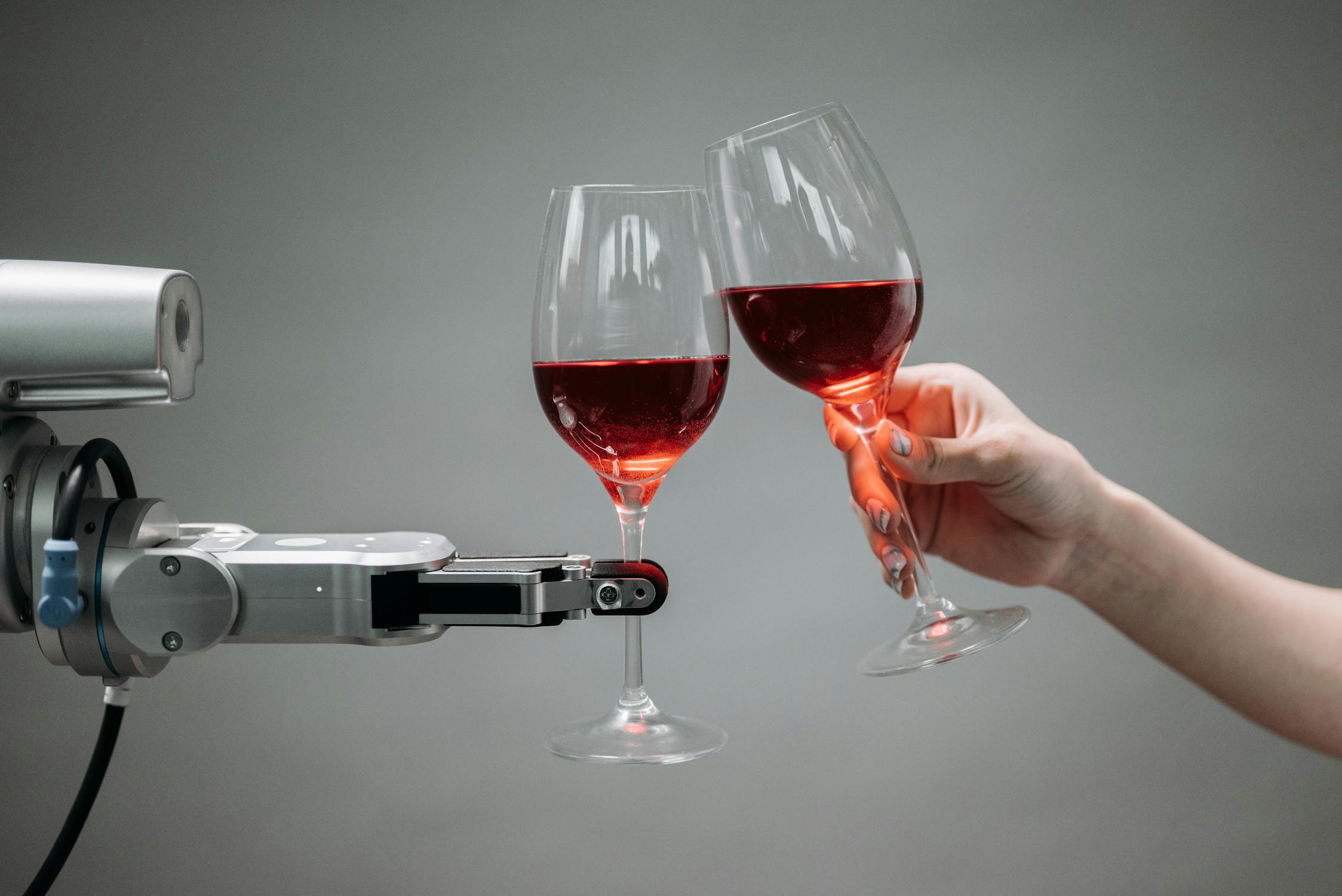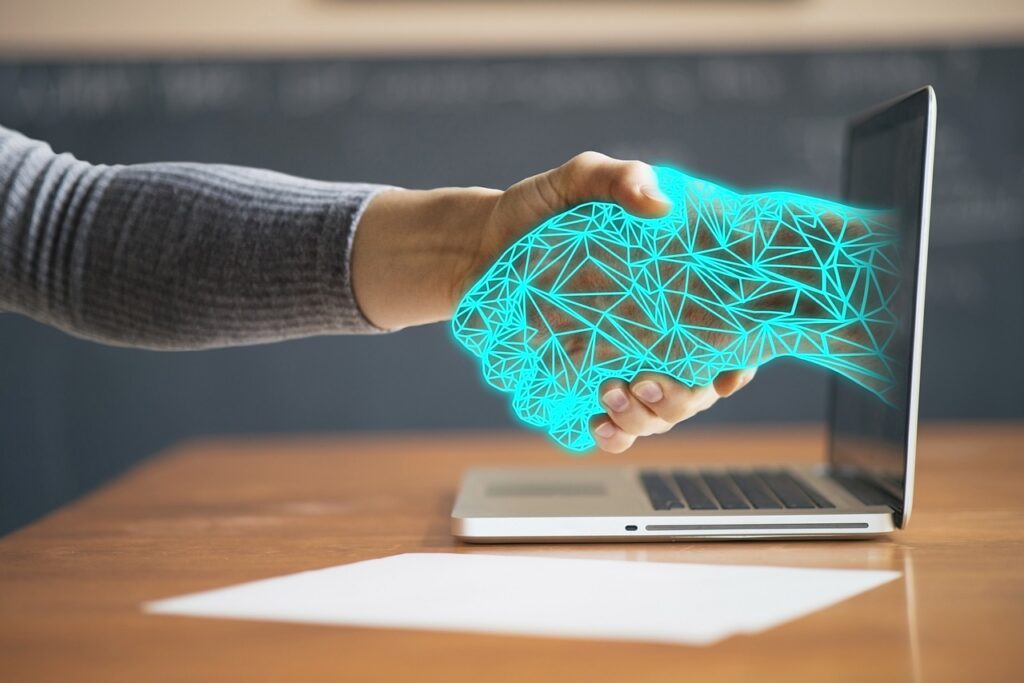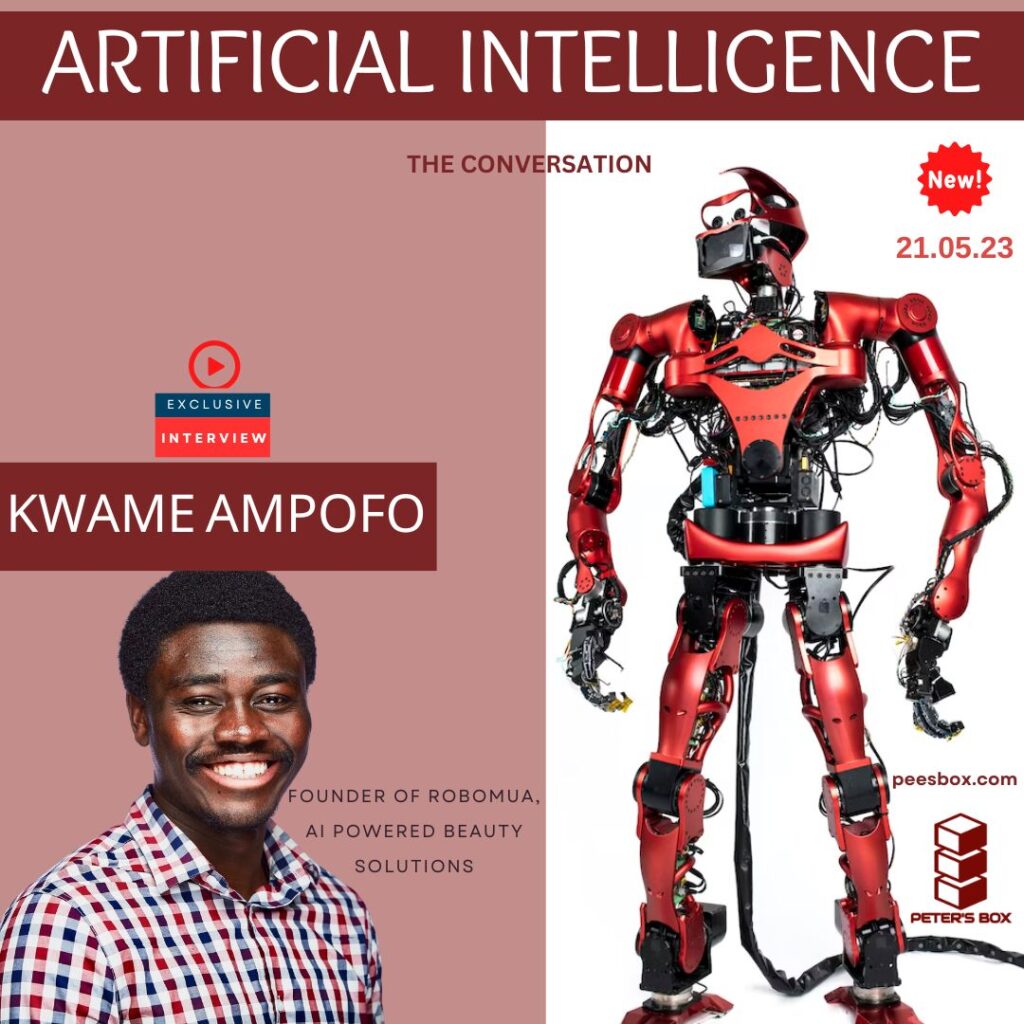Last updated on June 2nd, 2023 at 06:55 am
Have you read the three-part series on CSI? Click here to read “Comprehensive Sexuality Ignorance.”
In today’s post, I share the transcript of my conversation with Emmanuel Kwame Ampofo Acheampong, the founder of Robomua, an AI-powered application that provides beauty solutions. The discussion focused on the emergence of artificial intelligence and its implications. The benefits, drawbacks, and management of artificial intelligence were covered.
To guarantee readability, the transcript has undergone comprehensive editing. The complete interview is accessible on YouTube at this link: https://youtu.be/NUEkRXCUE9s.
Do you think the rise of AI will do more harm than good to society? Give our conversation a read and share your thoughts in the comments section.

What is artificial intelligence?
Peter: Hello, Emmanuel Acheampong. It’s a pleasure to have you here on Peter’s Box. And I’m excited; I’m pumped up for this conversation because I’ve been following you, and I know you are students of history, and this conversation about AI is something that has been going on for a while. But a lot of people are not so confident in certain answers they receive. But since you’re an industry player, you’re a software engineer, and you’re also the founder of Robomua, it’s quite interesting to know the perspective of industry players. So today we are going to discuss the rise of AI, its advantages, and what we should expect. Is the promise worth it? Or are we just tickling ourselves and hoping that things go well? So, just to begin, I would ask, “What is AI? We’ve been hearing the word AI, AI, AI: artificial intelligence. What the hell is it?”
Emmanuel: First of all, nice to meet you, Peter, from Presec days until now. So, it’s great to be connected again. AI is a very broad field that encompasses multiple fields of study. There’s engineering, but there’s also philosophy, sociology, and ethics about how we make machines behave in a human-like way. So, it’s a very broad field that encompasses multiple things about how we make machines behave in a human-like way. That’s the most basic definition I can give.

Is AI intelligent?
Peter: Okay, but I’m more curious about the term intelligence. You know we have artificial, and now we have intelligence. What makes it intelligent? What is the best word to describe the phenomenon? Maybe you could have used “artificial automation,” and that would have done the job. Why the word intelligence?
Emmanuel: I think people have a lot of definitions of intelligence, right? When we were in school, they were like, “Oh, this guy is intelligent; he’s a blah, blah, blah, blah, blah, blah. But intelligence, at its core, is being able to process data to give information at a particular time, right? So, there are people who can process visual data very quickly, and they’re able to recall that information when it’s needed. So maybe they pass exams, but that’s one form of intelligence. But there are other forms of intelligence. First of all, I want us to take that whole definition of intelligence and look at it very differently. The reason we say something is artificially intelligent is that we are allowing these non-human things to process data and provide information at a particular time. That’s all it is. It’s not like wisdom, where it’s just, “Hey, there’s a bunch of data that this machine can process very quickly and give us information at the time that we need or want.” And that’s where the intelligence aspect comes in. Thus, it’s less about the way some people think of intelligence and more about, hey, processing data and delivering information at a particular time. That’s all intelligence means.

Peter: Okay, thank you. Does that mean we can consider robots—specific robots—intelligent if they are able to deliver or process some particular data?
Emmanuel: Absolutely. Even if you take robots out and look at humans, we tell people who can pass exams because they’re able to process the questions and provide answers that they’re intelligent. At that less level, some robots are, because they can process visual data surrounding them and can make decisions to provide that information of what to do. Some robots can navigate their surroundings because they’re able to process visual data to know whether they should go left or right around an obstacle. And that’s like some form of intelligence.

The origin of AI
Peter: Okay. But when did this all begin? When did AI first emerge? Was there a particular point where scientists came together to say, “Okay, we are going to start this AI revolution”? Or has it always been there with us? Where do we demarcate the boundaries of its inception?
Emmanuel: With regards to artificial intelligence, know that the term AI was coined in the 1960s. In the 1960s, engineers were like, “Hey, let’s create a phenomenon, or like a field of study called artificial intelligence.” And they formalized that. But ever since we’ve had tools and machines to help us do things, I think we’ve always wanted to have intelligent stuff, right? Even if you think about how we were able to domesticate dogs, we didn’t just want them as pets. We needed them to be intelligent pets, so we started training dogs to do certain acts. That’s the same thing with machines. If you go back and look at Hollywood, for example, or if you read books like Frankenstein’s Monster, those are all examples of how we wanted to make things that were inanimate, intelligent, and animated. That has always been part of human history, per se. But the term artificial intelligence was coined in the 1960s. So, think the late 60s or early 70s.

Delineation of AI
Peter: Okay, thank you. Does that mean we can consider robots—specific robots—intelligent if they are able to deliver or process some particular data?
Emmanuel: I wouldn’t use Google per se because Google uses its algorithms, like the search engine. I think now they’re trying to make other things. But there have been things that have been artificial intelligence, like Siri on smartphones and Samsung’s Bixby. I think we’re going to upload this video on YouTube. If you look at YouTube, the way YouTube can monitor content, you can’t hire millions of people to check every single second of every single video. That’s a lot, like every minute. YouTube has hundreds of thousands of minutes of videos uploaded every single minute. And they need to check those videos for copyright content, music violations, and sometimes inappropriate content. And you can’t have humans doing that; even though there are humans that help, they’ve built these AI algorithms that can process information quickly to deliver results. So, AI is not just limited to robots. I think robots are like the peak version. If you think of us wanting to make a machine artificially intelligent, as humans, I think we want that machine to be like us, right? But that machine doesn’t necessarily have to be like us to be intelligent if that makes sense. I will say that the reason why a lot of people think of Terminator and robots is because Hollywood, since the dawn, has always had this fascination with making machines. Hollywood is the one that pushed that narrative, whether it’s iRobot or even if you look at these black-and-white movies or movies about robots taking over the world, right? So, Hollywood has always had this agenda that they push that is outside the actual field. That is why people think of Terminator, but a machine doesn’t have to look like us to be intelligent.

AI-powered products
Peter: Can you give us some examples of everyday services or products that are powered by AI? You’ve mentioned Siri.
Emmanuel: Yeah. Of course.
Peter: You mentioned Siri.
Emmanuel: Yeah. YouTube. YouTube is one—for content moderation and social media. All the social media platforms are using some form of it for content moderation, right? Like suggestions. When you go on certain websites that have recommended systems, like Amazon.com, they’re like, “Hey, you bought this; you might be interested in buying this and this.” Those recommended systems are all models that have been trained on data to help people get the results that they need. But I think people look out for the fascinating ones, like self-driving cars; those are all cool. However, in everyday life, you are encountering artificial intelligence models in some way or another.

Are computers considered AI?
Peter: Now I’m getting the picture of algorithms being used to process some data to produce some particular result. With that said, it means that a basic computer should be considered AI.
Emmanuel: Okay. So, the thing that a basic computer does is that you give it information and it gives you results, right? But what AI does is train itself. Let’s take the way a child learns how to speak. If you have a kid or a junior sibling you’re teaching to read, you show them the bus. And you say, “Hey, this is a bus.” You don’t show it once. You show multiple times that this is a bus, right in the book. And then all of a sudden, the child can go outside and be able to point to a bus and say, “Hey, this is the bus,” even if you don’t tell that child that this particular thing is a bus.
I don’t know if that makes sense. So the thing about AI is that because we give them all that information early and train them to say, “This is what you need to be looking out for,” AI can predict things that they’ve not seen before. Take ChatGPT, for example. I know we might be talking about it later on, but what they’ve done is take a whole lot of information from the Internet. And they’ve shown those AI models what the questions are and what the answers are. Questions are, answers are, questions are… so much information. So right now, if you ask it a question that it has never seen before because it’s seen multiple questions and answers, it’s able to predict what the answer should be. And that’s the difference between, say, ChatGPT on your smart computer. However, your regular computer can only give you the information that you’ve given it. AI can predict or create things that it has not necessarily been given, but it can do that based on the previous information it has been exposed to.

Advantages of AI
Peter: OK. Can you tell us some key advantages of AI and some specific things that AI does? I know we’ve mentioned automation, but are there other benefits of AI that we have to take note of?
Emmanuel: The biggest thing that I think everybody kind of overlooks is that information has exploded. When we were young, the available information has now exploded. There’s more information now available than ever before in human history. And that information is multiplying. And it’s getting bigger and bigger. It’s humanly impossible for one person to be able to have access to all that knowledge and process it at a very fast rate. It’s virtually impossible. With the YouTube example, it’s impossible to have somebody sit down and watch every second of every video that is going to be uploaded on YouTube to flag which ones are wrong or which ones are right, right? So we need a more fast and efficient process. So it’s like, hey, can the algorithm be able to identify stuff? Then a human can go in and specify and say, okay, this is wrong or right. That’s an easy example. Anything that requires massive data that needs to be processed at a high level needs some version of human systems, AI models, or AI-assisted programs.

The way I also see it is that… this is my personal view; the way humans were able to domesticate dogs to help us make our lives easier, I think that’s how we should think of it. We need to be able to help make machines that will make our lives easier. Whether we like it or not, life is moving so fast due to so many other factors. Things are growing at a very rapid rate. And as a human, it’s very, very hard to encompass all of that. We need to sleep. We need to rest. We have other needs that are not just in terms of accomplishing work tasks. So being able to have systems that are intelligent and can think the way we think can help.
We’ve seen ChatGPT as an example: do helpful things, and help people write things. We’ve seen it pass exams, right? Letting us know that, hey, maybe our educational system needs a bit of improvement if a robot can just see information and pass our exams, right? This is just what I’m thinking personally. Do you see the way we were able to domesticate dogs to help our lives become better? I think we are in that phase where we are trying to domesticate machines to make our lives better.

Efficiency vs. inefficiency
Peter: Okay, that’s well noted. So, it’s an issue of efficiency. And I actually agree with you because, in my line of work, I deal a lot with data, and there was this time that I had to compare some lines of data in an Excel sheet to a free text. Meaning that I need to pick each cell and compare the contents of that cell to a free text. And what it means is that I need to press control plus find throughout. So, if I have a thousand-line items, I need to press control plus find to compare the data. But I was thinking that, hey, I can actually use my Matlab programming to probably get a code to do that for me. So, for efficiency, it will be good if I have a kind of system that is able to do that for me without spending so much time on each line of data. In fact, I will come to you so that you give me a Python code to do that because I’ve been thinking about how to do it.
Emmanuel: You should learn Python. I’m a huge advocate.
Peter: We will have that conversation. Now that we know of the advantages of AI, which basically are efficiency and training systems to be able to identify and learn new information or process new information, what are some of the key weaknesses that are quite pronounced in AI?

Disadvantages of AI
Fear of the unknown
Emmanuel: Every human invention has its flaws. Every human ideology has its flaws. Every human field of study has its flaws. If you look at religion, it has some flaws. If you look at even physics, there are flaws there as well. Every educational system has its flaws, so artificial intelligence has its flaws as well. Because it’s a human creation, flaws are bound to happen. I think the biggest flaw is the lack of the unknown. I remember having a conversation with one of my mentors. When the Internet was first created. Everybody was writing things. Everybody was saying so many things like it’s going to take away jobs, it’s going to do this, it’s going to do da, da, da, da. It’s the same thing with artificial intelligence. And nobody can predictably determine what it’s going to be or what it’s not going to be. We have no idea. We are all just making assumptions and presumptions.
One thing that I would say is that every time there’s a new technology introduced, there’s a lot of hype. The hype comes down, there’s a lot of fear, and then it comes down eventually. So again, with the Internet or even electricity, whenever we create these advancements, there’s a lot of hype for them. But with that hype comes a lot of fear. With AI’s fears, most of it is based on data that they’ve seen, but most of it is also data that people assume they’ve seen. An example is the notion that AI is going to take over the world. It’s mainly because of the perspective that Hollywood has pushed on us even before we were able to build these systems. But the biggest thing is that we don’t know. Because of the way it’s trained, if we give a system so much information to be able to make predictions, you have no idea how it’s going to do it. You have no idea what it is going to be used for. That’s the biggest weakness because you can only assume you know what it’s going to do, but you have no idea how it’s going to react or what people are going to be using it for. I think that’s the biggest weakness.

Racial discrimination
Emmanuel: The other weakness, I think, is that not a lot of different groups of people are involved in its creation. If you are creating something that you say is for the whole world, but then people from all over the world are not part of the creation, you know you can make certain mistakes. Take an example like ChatGPT. If you ask it specific Ghanaian questions, it’s going to fail. It’s going to fail horribly.
If you look at Siri, I don’t think she can even process any Ghanaian language. It’s because they’re building these things but taking so many different parts of the world out of the creation. If you’re building something for the whole world and it’s just a few people who are building it, know that we’re going to have a lot of blind spots. There are lots of blind spots in the field. And I think the final thing is that there are dangers. There are dangers to this. Electricity can be dangerous. The Internet can be a dangerous place, you know. So that’s how I see it, right? Just like electricity, just like the Internet, we need caution as we progress, but we also need laws to make sure that things don’t go wayward.

The fear of AI
Peter: OK, so you’ve touched on quite several questions I was about to ask. You mentioned the fear of AI taking over our jobs. But where does this apprehension come from? Because it looks like this particular generation of AI development is quite advanced as compared to the move from, let’s say, the typewriter to the computer. Now we’re moving from basic processes to cognitive processes, and people are wondering what’s ahead for us. Example: I’m a blogger, and now we have bloggers who go to Chat GPT to generate a whole blog post, and you might not even know that this was generated by AI. So is that fear valid, and how should we overcome it?
Emmanuel: Before I even answer that question, I think what you said is true. We are moving at an unprecedented pace. The reason why, and I think a lot of people always take out that part, AI has seen so much growth is that the core technology has gotten to that point. The processing power has gotten to that point, and the data has gotten to that point. If you knew how much data people generate on Twitter every second of every minute of every day, you’d be blown away. The data that we are receiving is way… I don’t know, I think there’s a ratio that they’ve been…they said it used to double eight times. It’s in the power of 10 at this point. So, every second, the data is growing.
And that is why the advancement of AI is moving forward. We have a lot more processing power now. We used to say that the technology in the spaceship that took people to the moon was less advanced than the technology in your mobile phone right now. Think about that. The power of that processor has been improved multiple times. Every year, there’s a new iPhone with a better processor. So, the processing power is just exploding at this point. The data is exploding, and the processing power is exploding. That’s what has made AI advancement skyrocket. The dangers of losing jobs—that’s a real fear.

Again, every time there’s a new improvement, like when humans moved from the Stone Age to the Bronze Age or from the Bronze Age to the Metal Age, people lose their jobs. Moving from the Stone Age to the Bronze Age, if you’re just a stonecutter and you don’t learn how to wield metal, you’re going to lose that job. But newer jobs get created. When the Internet came, a lot of retail businesses were affected. But then they’re able to convert those retail businesses into online businesses. Social media affected some people, but then we had social media influencers. I doubt in the 70s anybody could have said, I’m a social media influencer as a full-time job. Some people create YouTube content as a full-time job. Because new technology has happened. So obviously, people are going to lose jobs, but that also means that newer jobs are going to be created. Whether it’s a good or bad thing, I think economists and sociologists should decide on that. But it is going to happen. People might lose their jobs because certain skills will be made redundant, but then new jobs will be needed. So, there’s going to be that creation.






Peter, you and Kwame pose interesting questions. AI can help us if used lightly to handle lesser tasks. But humans do best if people use their minds, their intelligence, their sharpness and mental clarity, to create, to serve and to help, most of the time, for bigger tasks. My happiness is in being truly helpful. If I outsourced the helpfulness I outsource my happiness.
Ryan
I saw a comment once that made me realize how unique humans are. The comment went something like this, “AI can only be as intelligent as humans make them.”